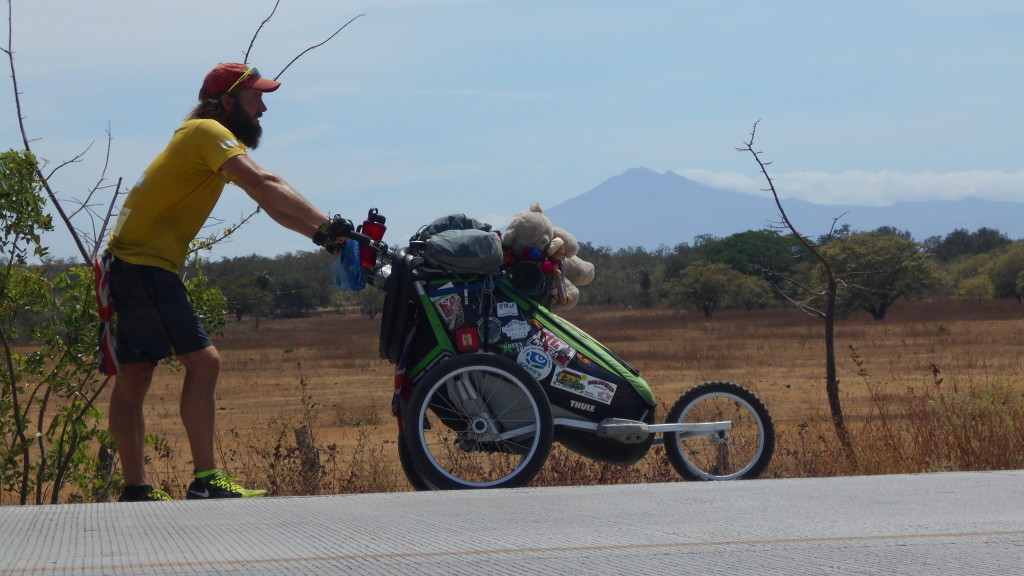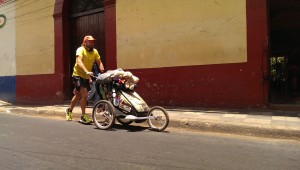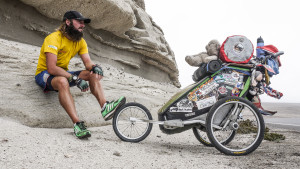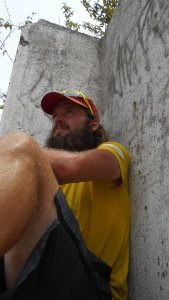
Jamie Ramsay has recently completed the conquest of a lifetime, running 11,000 miles from Vancouver to Buenos Aires, taking 600 days. To find out why and a little bit more about it, Tom Bristow spoke to the man now known as: The Running Man.
You’ve just returned from running 11,000 miles from Vancouver to Buenos Airies, which lasted 600 days, how are you feeling?
I’m not going to lie, it’s pretty weird. A lot of people thought I would be overjoyed to have finished, but the truth is I really loved the whole experience. I was happy when I finished my job, but sad when I finished the expedition. I always knew that this part of my life couldn’t last forever and there are a lot of great things about being back like seeing family and actually spending time with my girlfriend. There is also the excitement of planning the next endurance expedition and getting to benefit from everything I learnt on this trip.
So, why did you do it?
It’s a horrible cliché, but I was sitting at my desk and realised that I was not a very happy person and didn’t feel fulfilled with what I was doing. I also say that I was the only barrier between merely existing and actually living life on my terms. The reason I chose running was not only because it was my passion, but because it was such a pure way to travel, and being on foot gives you a unique perspective of a country. I could have walked, but I wanted to do something a little more physically demanding.
 Are you the real-life Forrest Gump?
Are you the real-life Forrest Gump?
Well, I do get the comparison a lot and to be honest, I quite like it. Some people turn their noses up and say you don’t want to be compared to him, but to me he was a good, honest person who didn’t let society’s restrictions stop him from living life to the full. Unfortunately I didn’t invest like he did…
Nearly two years on the road is a long-time, are you a changed man?
People say that something like this changes you and I suppose it does a little. I prefer to see it as a period of time in which you can get to know yourself better. Having so much time available to just sit and analyse yourself is healthy. I have made changes, for instance, I’m taking a break from booze. I looked back at my relationship with alcohol and realised I could make better choices. It also helped my running hugely. Recovery times improved, motivation was up and I took a lot less rest days.
Logistically, how did it work? Did you run the same amount everyday, or did you have a pre-determined route? Did you always run alone?
Everyone thinks that an expedition like this would take an obscene amount of planning, but in reality, it really didn’t. I knew where I was starting and where I was finishing, everything in between was planned on a day-to-day basis. You can’t predict how the body will feel or react to changes in weather or conditions. Some days I would run a marathon, some days over 60K. It also depended on where towns were. If I needed water or food I might need to run a little further, or if there was something worth stopping for then I would stop. In the end, I averaged over a marathon on each running day, which is a lot more that I originally planned.
Did you ever consider stopping?
 Never, I set out to achieve something and show that everyone can achieve something if they put their heart and soul into it. That doesn’t mean there weren’t times when it was hard or everything was going wrong, but on reflection, they are the times you remember because they are the times you improved and learnt how to deal with new challenges. If it was all easy, there would be no point in doing it.
Never, I set out to achieve something and show that everyone can achieve something if they put their heart and soul into it. That doesn’t mean there weren’t times when it was hard or everything was going wrong, but on reflection, they are the times you remember because they are the times you improved and learnt how to deal with new challenges. If it was all easy, there would be no point in doing it.
What was the hardest part?
The Ruta 34 in Argentina was very challenging. It was over 700km long, mostly straight and flat with nothing to look at and on some days over 45 degrees. To make things worse, it was only two lanes, had no hard shoulder and was the main route from Argentina to the North. Every day I would have to dive off the road to avoid being run over by angry lorry drivers.
Which location was your favourite to run through?
There are two, but they were combined. The Atacama and The Andes. This was essentially everything from Arica in Chile to Jujuy in Argentina. The scenery was intensely beautiful, the running challenging and the logistics complicated, but all that made it the most perfect setting for an adventure runner. During the day it would be hot and at night your water would freeze in your cup. The wildlife was also amazing with vicunas and flamingos dotted around. It’s pretty awesome to say you ran across one of the driest places on earth and then over a mountain range higher than anywhere in Europe.
 Did you encounter any strange or wacky experiences along the way?
Did you encounter any strange or wacky experiences along the way?
It’s strange, but after being on the road for such a long time the strange and wacky started to become normal. I met people who thought they could change rocks to gold, I shared bath-time with members of the Embera people in Panama, I had police escorts through deserts and camped in some pretty cool places.
What do you miss most about the challenge now?
Being on the open road and the simple life that comes with it. Ever since I have been back, life as revolved around so much admin just to get from day to day. I sometimes lie in bed, close my eyes, imagine a particular spot and then try and retrace my steps of that day. The only remedy for this is to plan another expedition.
What advice would you give to those wanting to attempt a challenge like this?
Pursue what makes you happy and don’t get fooled about how much work it is to get planned. It seems a lot of adventurers try to stress how hard it is or how long the logistics take. This expedition took a matter of weeks to plan. But most importantly, don’t let you be the barrier to achieving your adventure.
What’s next?
Right now I am trying to do everything I can to get another expedition together. I learnt so much on this one that I feel I could do the next one more efficiently, and there is so much world out there to be run!
Jamie Ramsay will be speaking at the Outdoor Adventure & Travel Show at London ExCeL, which takes place from February 11-14 2016: www.telegraphoutdoorshow.co.uk






